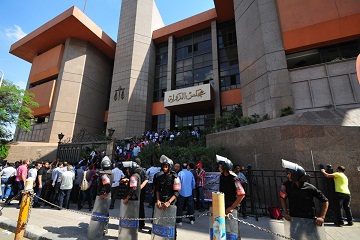Cairo: The latest fatalities due to the H5N1 strain, known as the bird flu virus, are due to poor hygienic practices and a resistance by poultry and bird handlers to put into effect government warnings, health officials have charged.
When Hanan Aboul Magd, 39, succumbed to the virus in the Nile Delta province of Gharbiya in October, she had been slaughter ducks which had fallen ill.
“People are sticking to their habits and they are forgetting our message, said Sayyid Abbasi, Ministry of Health spokesperson.
But despite consistent warnings from the ministry and other government bodies, people in Gharbiya are continuing to slaughter affected birds and poultry.
The death of one woman on Saturday and the hospitalization of three of her kin were directly attributed to similar events in October – the slaughtering of diseased poultry.
In early November, Prime Minister Ahmed Nazif met with his cabinet to outline a strategy during the winter months. The Ministry of Health has warned that risk is substantially elevated during the winter season, a period of time which also coincides with the migratory December to February season.
The outbreak that swept through Egypt last year coincided with the migration season.
Egypt’s densely populated Nile Valley saw the worst concentration of bird flu infection this year outside Asia. The Valley lies on major routes for migratory birds, and has a large rural population that has traditionally reared poultry for food and income.
It s an animal virus. We have to accept that, Talib Ali, regional animal health and production officer for the UN-affiliate Food and Agriculture Organization, earlier told The Daily Star Egypt.
He explained that the danger lies in the possibility of the virus mutating so that it could be transmitted from human to human.
Last year to cope with the onslaught of the illness, the government established a special committee to combat bird flu. The birds on numerous poultry farms were executed on the grounds that they were infected.
The poultry industry suffered major financial losses. A number of its professionals demonstrated, demanding compensation.
The government, however, won t change the procedure it adopted last year, according to Rady. Additionally, the government will keep in mind that the situation might turn into a pandemic, he told local press.
Domestic poultry remains an issue. Most fatalities in Egypt were the result of direct contact between humans and domestic poultry.
In spite of efforts to control it, the widespread practice of home-raising poultry persists. Backyard farms produce a third of the country s poultry production, according to Ali.
Food security, is at the top of the list of concerns, added Ali.Recognizing the infeasibility of eliminating backyard production, especially since it is the main source of food for many low-income families, he recommends a number of procedures.
He suggests educating these families about hygienic cooking, providing them with vaccinations and compensating them for infected poultry.
The government has overseen the culling of some 30 million birds over the past eight months, and has put into place tough restrictions on poultry keeping. So-called ‘backyard birds’, which are chickens or ducks kept in small numbers in low-income homes for extra food or cash, have been outlawed.
“It is a matter of changing behavior. People are sometimes not honest [about keeping birds]. They know they are in danger but for other reasons they still have them, said Dr John Jabbour of the Communicable Diseases Surveillance Department at the World Health Organization’s regional office in Cairo.
Dr Jabbour added that the government has succeeded in removing poultry from the homes of people in Cairo “but in more rural areas people are not accepting that they have to get rid of backyard birds .
Economic hardships are cited as serious challenges in removing poultry from households.
With a national production of 1.7 million chickens per day and expected to jump to 2.6 million in mid-2007 the government has drafted a law that would eliminate the sale of live poultry by 2010.
Under the proposed legislation, the Ministry of Finance (MOF) would enter a partnership with private poultry distributors to fund the establishment of Ministry of Agriculture-monitored abattoirs.
The facilities would then be used to produce chilled or frozen poultry, replacing backyard farms and the current practice of selling live poultry through private butchers.
The proposed law allows producers in the Greater Cairo and Alexandria governorates to continue selling live poultry until the end of 2007. It divides the remaining 23 governorates into two groups, one of which will be given until the end of 2008 and the other until the end of 2009.
Several automated and semi-automated slaughterhouses are now under construction, according to Abaza. Cairo for Poultry is set to open a Nubaria abattoir with a daily production capacity of 150,000 birds by the first quarter of 2007.


